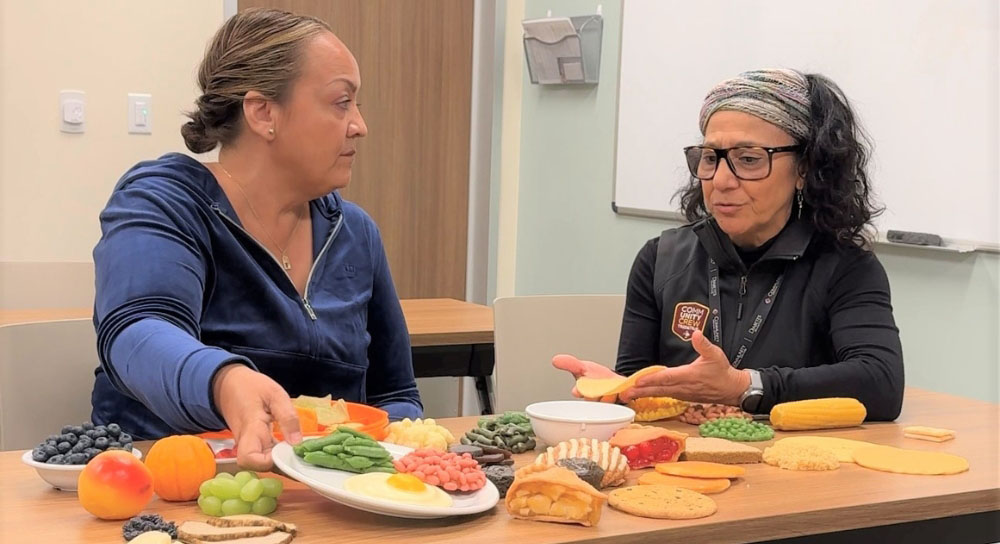The birth of a child can be one of life’s happiest milestones. But most mothers will tell you the changes that come with a baby can hit in unexpected and powerful ways. Hormone changes, sleep deprivation, social pressures and more can trigger emotions ranging from joy and contentment to anxiety and feeling overwhelmed or depressed.
Amy Parks, coordinator of the UCSF Fresno Pediatric Residency Program, is on a mission to help moms get the mental health support they need. The key to her plan is pediatricians.
“Your pediatrician is a perfect place to go for help. It's a safe, supportive space and in the first year of your baby's life, you're there a lot,” said Parks, noting between regular checkups, immunizations and the inevitable earaches and teething fevers those pediatric visits to the clinics on Community Medical Centers’ campuses could be nearly every month. She urged mothers to feel free to “Just say ‘hey, this is how I'm feeling. Is this normal?’”
Expanding access to mental health helps moms and babies
Parks trains pediatricians to see caring for mothers as part of caring for kids. “Mom's mental health affects everybody in the family and can have long-term impact on a child’s development,” she said, “so we teach pediatricians to ask questions. If mom needs help, then we can refer her to one of the many perinatal mental health groups here in town.”
The Central San Joaquin Valley has the greatest shortage of psychiatrists in California — nearly 2½ times fewer per 100,000 people than the rest of the state. Teaching other kinds of physicians to spot the signs of anxiety and depression — or at least ask about emotional and psychological issues — helps expand mental health access to more Valley families. Parks said more primary care doctors are being trained now to also treat postpartum depression.
UCSF Fresno and Community Medical Centers are hoping to make it easier for mothers struggling with what might be postpartum depression, since it can affect their children’s development and health.
Many women talk to their own doctor about their postpartum struggles, Parks said, “but a good majority of the moms we see don’t have their own primary care practitioner, only an OB. And for many, that OB care ends six to eight weeks after birth when their emergency Medi-Cal ends.”
As part of regular pediatric checkups, UCSF Fresno pediatric residents ask moms to fill out a quick 10-question survey about how they’ve felt over the past week. Any answers that raise alarm, warrant a referral and follow up.
Negative emotions after childbirth are more common than most people think. One in 7 women experiences serious depression in the year after giving birth, a study of 10,000 women found. Other surveys estimate the rate may be as high as 20% or 1 in every 5 new mothers. Up to 80% of new moms get “baby blues” and experience common symptoms like sadness, anxiety, stress, and mood swings. These symptoms usually pass within a few weeks, but not always.
Fear often gets in the way of admitting depression
Talking to a doctor about persistent negative emotions can help, but moms, busy with so many other new responsibilities, often find it hard to make time for their own emotional needs. Fear of being labeled as “weak” or “unfit” or “crazy” can also keep new mothers from seeking help.
Jana Brewer, mother of two, remembers the highs and lows of becoming a new mother.
She says no matter how much you prepare, there’s no substitute for experiencing it yourself and there’s no escaping the fatigue that comes with the role. “You're constantly second-guessing yourself and are just overwhelmed and tired. So, while you're enjoying it and the little smiles bring joy, you're also just drained.”
Brewer shared her emotions with other moms instead of her pediatrician, but sees the value in having the support at those frequent doctor visits during a baby’s first year. “You’re there for your baby, but having a pediatrician who’s equipped with the right questions can make a difference. If a pediatrician had asked me point blank, I probably would have admitted something was wrong.”
Both Parks and Brewer agree speaking up about your own mental health needs is a critical part of becoming the best mom possible. “Don't be afraid,” Brewer said. “Don't be afraid to reach out to your doctors and ask questions or seek care. Just speak up and surround yourself with people that can help you be your best.”






